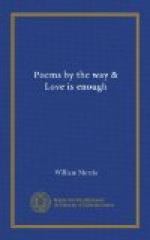Agnes before her true-love did stand:
“May I wend to the church of the English Land?”
“To England’s Church well mayst thou be
gone,
So that no hand thou lay the red gold upon.
“So that when thou art come the churchyard anear,
Thou cast not abroad thy golden hair.
“So that when thou standest the church within,
To thy mother on bench thou never win.
“So that when thou hearest the high God’s
name,
No knee unto earth thou bow to the same.”
Hand she laid on all gold that was there,
And cast abroad her golden hair.
And when the church she stood within,
To her mother on bench straight did she win.
And when she heard the high God’s name,
Knee unto earth she bowed to the same.
When all the mass was sung to its end, Home with her mother dear did she wend.
“Come, Agnes, into the hillside to me, For thy seven small sons greet sorely for thee!”
“Let them greet, let them greet, as they have will to do; For never again will I hearken thereto!”
Weird laid he on her, sore sickness he wrought, Fowl are a-singing. That self-same hour to death was she brought. Agnes, fair Agnes!
KNIGHT AAGEN AND MAIDEN ELSE
TRANSLATED FROM THE DANISH
It was the fair knight Aagen
To an isle he went his way,
And plighted troth to Else,
Who was so fair a may.
He plighted troth to Else
All with the ruddy gold,
But or ere that day’s moon came again
Low he lay in the black, black mould.
It was the maiden Else,
She was fulfilled of woe
When she heard how the fair knight Aagen
In the black mould lay alow.
Uprose the fair knight Aagen,
Coffin on back took he,
And he’s away to her bower,
Sore hard as the work might be.
With that same chest on door he smote,
For the lack of flesh and skin;
“O hearken, maiden Else,
And let thy true-love in!”
Then answered maiden Else,
“Never open I my door,
But and if thou namest Jesu’s name
As thou hadst might before.”
“O hearken, maiden Else,
And open thou thy door,
For Jesu’s name I well may name
As I had might before!”
Then uprose maiden Else,
O’er her cheek the salt tears ran,
Nor spared she into her very bower
To welcome that dead man.
O, she’s taken up her comb of gold
And combed adown her hair,
And for every hair she combed adown
There fell a weary tear.
“Hearken thou, knight Aagen,
Hearken, true-love, and tell,
If down-adown in the black, black earth
Thou farest ever well?”
“O whenso thou art joyous,
And the heart is glad in thee,
Then fares it with my coffin
That red roses are with me.
“But whenso thou art sorrowful
And weary is thy mood,
Then all within my coffin
Is it dreadful with dark blood.




